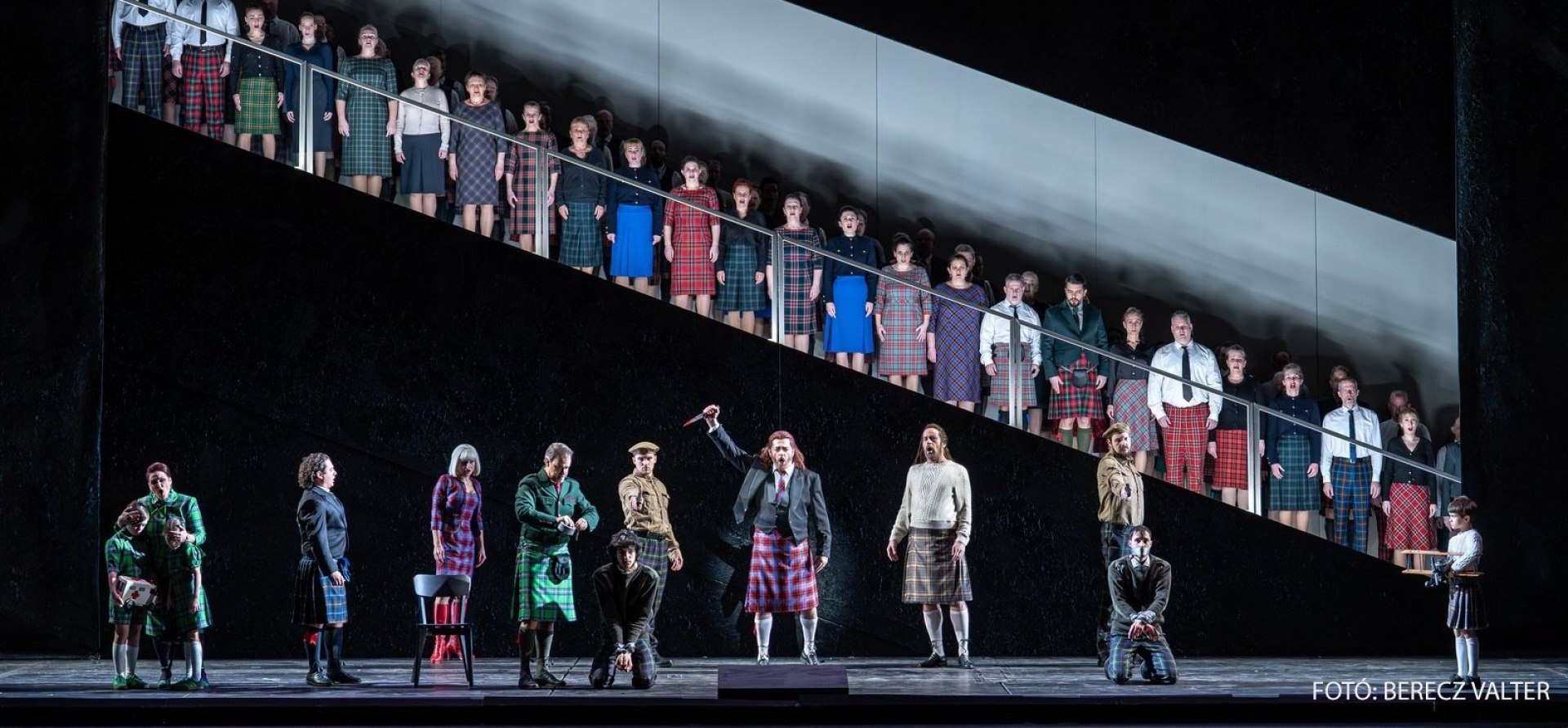Macbeth
June 2026 | ||||||
|---|---|---|---|---|---|---|
Mo | Tu | We | Th | Fr | Sa | Su |
Macbeth – Giuseppe Verdi
Opera | Contemporary
Running time: 3 hours 15 minutes, including one interval
Language: Italian
Surtitles: Hungarian, English, Italian
Macbeth hears a prophecy from three strange witch-like figures that he will become king of Scotland. The news triggers a series of brutal thoughts and actions in him and even more so in his wife, Lady Macbeth. It was not by chance that Verdi chose this Shakespeare text as the basis of his opera: the title character goes through the hell of spiritual depth, doubts and ruthlessness, unearthly forces, dramatic murders, and psychic turmoil again and again. Situation and motifs that yearn for an opera stage and unfold to music. The production is staged by Matthew Wild, who is widely recognized as a leading musical theatre director of his generation in South Africa, and he is now an increasingly sought-after artist on European stages as well. His productions are praised for their intelligence, visual prowess, and musicality. The clash of cultures and their influence on each other also play an important role in his Macbeth performance, just as the earthly and mystical-transcendental worlds intertwine as sharp contrasts in the opera.
Age restriction: The performance is not recommended for children under 14 years of age.
Parental guidance: Strong flashing lights are used in some scenes of the performance which could disturb those with photosensitivity.
Synopsis
Scotland; some time in the near future. The United Kingdom has splintered, and democracy has given way to authoritarian dynasty rule in the independent nation. National dress has become widely embraced, and border conflicts with England are once again commonplace.
ACT I
As they return victorious from the battlefield, Scottish generals Macbeth and Banquo meet three witches who prophesy the future. They address Macbeth as Thane of Cawdor and King of Scotland, and tell Banquo that he will be the father of kings. The two men try to learn more, but the witches vanish. Messengers arrive with news that Duncan, the current king of Scotland, has made Macbeth Thane of Cawdor. The first part of the witches’ prediction has come true.
In Macbeth’s castle, Lady Macbeth reads a letter from her husband telling her of the events that have just transpired. She resolves to follow her ambitions, and calls on demonic spirits to remove her maternal instincts. A servant announces that Duncan will soon arrive at the castle, and when Macbeth enters, she tells him that they must kill the king. Duncan arrives with the returning war heroes: his son Malcolm, Banquo and Macduff, leading to a series of happy family reunions. Macbeth has a vision of a dagger, then leaves to commit the murder. On his return, he tells his wife how the act has frightened him, and she tells him that he needs more courage; she returns to the site of the murder to smear blood on the King's sleeping attendants.
Banquo enters with Macduff, who discovers the murder, and tries to shield his wife and children from the awful sight. Macbeth and Lady Macbeth pretend to be horrified and join the others in condemning the murder, before Macbeth accuses and executes the King's attendants.
ACT II
Macbeth has become king. Malcolm has fled to England, stoking suspicion that he may have been behind the plot to kill his father. Worried about the prophecy that Banquo’s children will rule, Macbeth and his wife now plan to kill him and his son, Fleance, as well. As Macbeth leaves to prepare the double murder, Lady Macbeth hopes that it will finally make the throne secure.
Outside the castle, assassins wait for Banquo, who appears with his son, warning him of strange forebodings. Banquo is killed, but Fleance escapes.
Lady Macbeth welcomes dignitaries to an unveiling ceremony, and sings a drinking song, while Macbeth receives news that Banquo is dead and his son has escaped. About to take Banquo’s seat, Macbeth has a terrifying vision of the dead man accusing him. His wife is unable to calm her unsettled husband, and the guests wonder about the king’s strange behavior. Macduff fears for his life and vows to escape to England, leaving his wife and children alone in Scotland.
ACT III
The witches gather in greater numbers, and Macbeth visits them, demanding more prophecies. Apparitions warn him to beware of Macduff and assure him that “no man of woman born” can harm him, and that he will be invincible until Birnam Wood marches on his castle. In another vision, he sees a procession of future kings, followed by Banquo. Horrified, Macbeth collapses. The witches disappear and his wife finds him. They resolve to kill Macduff, Lady Macduff and their children.
ACT IV
On the Scottish border, Macduff has joined the refugees. His wife and children have been killed. Malcolm appears with English troops and leads them to invade Scotland.
Lady Macbeth is sleepwalking, haunted by visions of those she and her husband have murdered.
Macbeth awaits the arrival of his enemies and realizes that he will never live to a peaceful old age. Messengers bring news that Lady Macbeth has killed herself, and that Birnam Wood appears to be moving. English soldiers appear, camouflaged with its branches. Macduff confronts Macbeth and tells him that he was not born naturally but had a Caesarean birth. He kills Macbeth and proclaims Malcolm king of Scotland.
Program and cast
Conductor - Martin Rajna
Macbeth - Attila Mókus, Michele Kalmandy
Banquo - Sándor Köpeczi
Lady Macbeth - Anna Netrebko, Csilla Boross
Lady-in-waiting to Lady Macbeth - Anna Csenge Fürjes
Macduff - Szabolcs Brickner
Malcolm - Barna Bartos
Doctor - Sándor Köpeczi
Servant to Macbeth - Bence Pataki
Herald - Bence Pataki
Assassin - Dávid Dani
First apparation - Boldizsár Zajkás
Second apparation - Anija Lombard (opera studio)
Third apparation - Luca Csörgeő univ.stud.
Witches - N. N.
Featuring the Hungarian State Opera Orchestra and Chorus
Director: Matthew Wild
Set designer: Sebastian Hannak
Costume designer: Heide Kastler
Lighting designer: Tamás Bányai
Video designer: Zsombor Czeglédi
Movement director: Eszter Lázár
Hungarian translation by Judit Kenesey
English translation by Arthur Roger Crane
Chorus director: Gábor Csiki
Hungarian State Opera
STANDING ROOM TICKETS - INFORMATION IN CASE OF A FULL HOUSE!
If all the seats are sold out for the selected time, but you still want to see the production on that day, 84 of the extremely affordable standing seats will be sold at the theatre, 2 hours before the start of the performance, with which you can visit the gallery on the 3rd floor. Tickets can be purchased at the ticket office of the Budapest Opera House. We would like to draw your attention to the fact that the stage can only be seen to a limited extent from the standing places and the side seats, but at the same time, following the performance is also supported by television broadcasting on the spot.
The Opera House is not only one of the most significant art relic of Budapest, but the symbol of the Hungarian operatic tradition of more than three hundred years as well. The long-awaited moment in Hungarian opera life arrived on September 27, 1884, when, in the presence of Franz Joseph I. the Opera House was opened amid great pomp and ceremony. The event, however, erupted into a small scandal - the curious crowd broke into the entrance hall and overran the security guards in order to catch a glimpse of the splendid Palace on Sugar út. Designed by Mikós Ybl, a major figure of 19th century Hungarian architecture, the construction lived up to the highest expectations. Ornamentation included paintings and sculptures by leading figures of Hungarian art of the time: Károly Lotz, Bertalan Székely, Mór Than and Alajos Stróbl. The great bronze chandelier from Mainz and the stage machinery moda by the Asphaleia company of Vienna were both considered as cutting-edge technology at that time.
Many important artists were guests here including Gustav Mahler, the composer who was director in Budapest from 1887 to 1891. He founded the international prestige of the institution, performing Wagner operas as well as Magcagni’ Cavalleria Rusticana. The Hungarian State Opera has always maintained high professional standards, inviting international stars like Renée Fleming, Cecilia Bartoli, Monserrat Caballé, Placido Domingo, Luciano Pavarotti, José Cura, Thomas Hampson and Juan Diego Flórez to perform on its stage. The Hungarian cast include outstanding and renowed artists like Éva Marton, Ilona Tokody, Andrea Rost, Dénes Gulyás, Attila Fekete and Gábor Bretz.

 EN
EN DE
DE IT
IT FR
FR ES
ES RU
RU JP
JP RO
RO
 Seating plan
Seating plan 